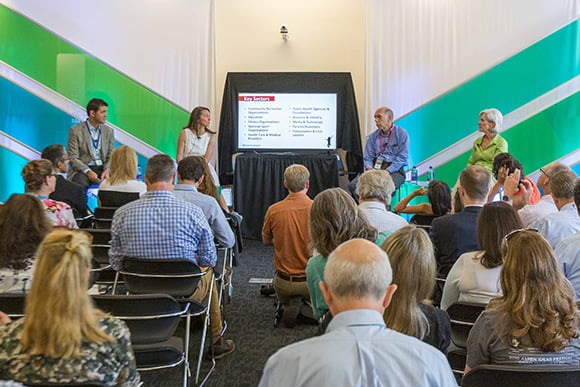 Tom Farrey, ESPN reporter and head of The Aspen Institute's Sports & Society Program, and Shale Wong, MD, professor of pediatrics in the CU School of Medicine, talk about physical literacy at the Aspen Ideas Festival. Photos by Matt Kaskavitch, University Communications.
Tom Farrey, ESPN reporter and head of The Aspen Institute's Sports & Society Program, and Shale Wong, MD, professor of pediatrics in the CU School of Medicine, talk about physical literacy at the Aspen Ideas Festival. Photos by Matt Kaskavitch, University Communications.
ASPEN, Colo. -- The cultural shift that has seen children move away from playing outdoors, joining pick-up games and using their imagination on the playground is contributing to catastrophic rates of obesity, type 2 diabetes and other serious health problems.
An effort to reverse this trend was the subject of “The Key to Population Health: Physical Literacy,” a discussion June 27 at the Aspen Ideas Festival's three-day Spotlight Health series. The discussion featured Shale Wong, MD, professor of pediatrics in the CU School of Medicine, along with U.S. Surgeon General Vivek Murthy, former U.S. Secretary of Health and Human Services Kathleen Sebelius and Ken Davis, president and CEO of Mount Sinai Health System in New York. Tom Farrey, ESPN journalist and head of The Aspen Institute’s Sports & Society Program, moderated the well-attended talk.
The CU Anschutz Medical Campus and its partners -- the CU School of Medicine, University of Colorado Hospital and Children’s Hospital Colorado -- were presenting underwriters of this year’s Spotlight Health series.
Farrey said the Sport & Society Program has convened thought leaders to launch a “physical literacy” movement – a multi-year effort to provide children with the ability, confidence and desire to be active. Currently, Farrey said, the nation has a “careless competition model” where kids are put in uniforms and expected to stay active for life.
It’s not working, as witnessed by startling rates of obesity, especially among African-American, Hispanic and low-income children. Davis said that Mount Sinai, which serves central and east Harlem in New York, sees an elementary school-aged population where 40 percent are overweight and 25 percent are obese. “We’re seeing an epidemic of type 2 diabetes as those kids get older and it’s very scary,” he said. “If we don’t see that this is a public health catastrophe, we’re missing the boat.”
'Everybody plays every day'

He said his personal pathway to physical activity started with playing baseball every day in the streets of Long Island, N.Y. “We’ve got to find a way to bring the kids back to the streets in some kind of way where everybody plays every day and can find out they’re a good runner.”
The goal of the physical literacy effort, detailed in the recent report “Physical Literacy in the United States: A Model, Strategic Plan, and Call to Action” is to have every child in the nation be physically literate by middle school by 2030.
The troublesome thing she sees in her pediatric practice, Wong said, is that many kids reach their early teen years “and because they haven’t had the opportunity and experience to gain these (sports) skills, they simply don’t know how to do them.” It’s an inter-generational problem, she said, because their parents are also not phsyically active. “We need the parents, the teachers, the coaches, health care providers … We need all kinds of people to be able to model this kind of (active) behavior. We’re focusing on kids, but it’s really across the lifespan.”
Sebelius said the dearth of exercise is also a major concern of U.S. Department of Defense leaders who see that one in three eligible American enlistees can’t pass the military’s physical test. She noted that the Affordable Care Act funds preventative health care and a national prevention strategy, but she agreed with Wong that inculcating children with physical literacy must start at young ages and involve their parents. “It can’t just be a federal platform; hopefully it will come down to the local level,” she said. “It’s really about schools, individual kids, individual playgrounds – how you drive that activity. … You build a lifetime of activity that you don’t lose, and that’s what we need to help kids develop.”
 The panel on "The Key to Population Health: Physical Literacy" included, from left, Tom Farrey, ESPN reporter and head of The Aspen Institute's Sports & Society Program; Shale Wong, MD, professor of pediatrics in the CU School of Medicine; Ken Davis, CEO of Mount Sinai Health System; and Kathleen Sebelius, former U.S. Secretary of Health and Human Services.
The panel on "The Key to Population Health: Physical Literacy" included, from left, Tom Farrey, ESPN reporter and head of The Aspen Institute's Sports & Society Program; Shale Wong, MD, professor of pediatrics in the CU School of Medicine; Ken Davis, CEO of Mount Sinai Health System; and Kathleen Sebelius, former U.S. Secretary of Health and Human Services.
'Very measurable'
An essential component of population health is a robust set of metrics to assess whether desired outcomes are being achieved, Wong said. “In kids we don’t have strongly defined quality measures in terms of how their health outcomes are being achieved in the health care setting specifically,” she said. “But this (physical literacy effort) breaks that down – it’s very measurable. (It asks) are these kids meeting these skills?”
The health care sector is working on how to better integrate initiatives such as physical literacy with communities, she added. The idea is to better tap into community resources and ways to guide families so that health care understanding is “beyond their 10- to 20-minute visit they have with their doctor, and it’s what they’re doing every day,” Wong said.
Davis said medical schools need to train pediatricians to emphasize physical activity benchmarks just as they do other milestones in childhood development.
Sebelius agreed , saying those benchmarks should be vigilantly checked on par with how academic milestones in reading and math are measured. As for the national rollout of the physical literacy program, Sebelius said the timetable should be aggressively moved up, otherwise “we’re going to lose another whole generation” of children. “I think federal policies can help frame this, federal money can help drive it, but it’s also got to be a grassroots movement with an insistence that this is a health crisis: We are killing our kids and we really have to do something about it.”
'They want it to be fun'
Wong is optimistic that with programs like physical literacy -– which is being integrated across all levels of society, from Head Start programs to professional sports leagues -- the nation is setting the stage for decreasing chronic illness and improving overall health.
The key, she said, is keeping it fun.
“Kids inherently want to play, they want it to be fun, and it’s contingent upon us to provide those opportunities for fun in their lives,” Wong said. “That way, they have enjoyable experiences in those early stages, and then they just want to keep doing it. So if we can really instill that in the youngest, then I think we’re absolutely on the right trajectory.”
Aspen Ideas Festival
The University of Colorado Anschutz Medical Campus was a presenting underwriter of the 2015 Aspen Ideas Festival’s three-day Spotlight Health series. Leading physicians and scholars from the CU Anschutz Medical Campus shared their insights and research with 1,000-plus attendees from June 25-28.
The high-profile Spotlight Health forum is an ideal platform on which to raise the profile of the CU Anschutz Medical Campus.
"The festival takes place in Aspen, our own backyard, and attracts attendees from around the country and the world," said Leanna Clark, vice chancellor of University Communications. "The Spotlight Health focus ensures that we are getting the Anschutz Medical Campus brand in front of the foremost academics, policy makers, practitioners, industry executives, philanthropists and concerned citizens, and engaging them in the conversation to transform health and health care.”
The Aspen Institute invited a group of "Spotlight Scholars" to attend the conference in recognition of their academic accomplishments and ability to translate ideas into action. Four scholars represented the CU Anschutz Medical Campus: Brandi Freeman, MD, assistant professor, Pediatrics-General Pediatrics; Jason Stoneback, MD, Department of Orthopedics; Roberta Capp, assistant professor, Emergency Medicine; and Christopher Porter, MD, assistant professor, Pediatrics-Hematology/Oncology.
